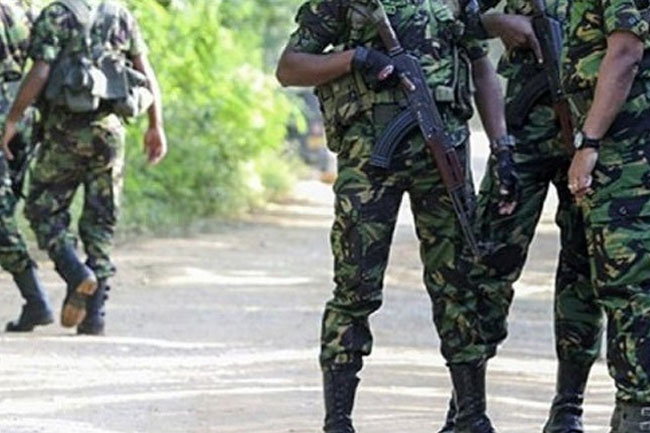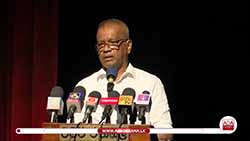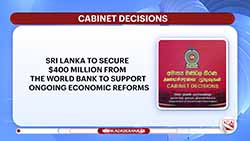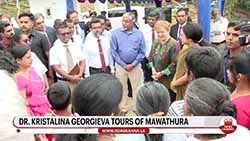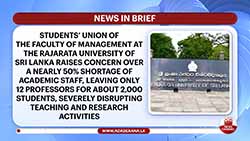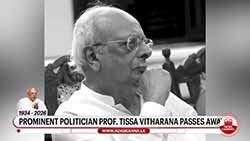Int’l rights groups urge govt to stop ‘abusive anti-drug operation’ and release arbitrary detainees
January 15, 2024 03:34 pm
Over 30 international human rights organisations including Amnesty International, Human Rights Watch and the International Commission of Jurists have expressed their deep concern regarding the “drastic intensification” of anti-drug operations in Sri Lanka leading to significant human rights violations.
Issuing a joint statement, the 33 international organizations demand the Sri Lankan government to stop the ‘abusive anti-drug operation’ and release the arbitrarily detained individuals.
Furthermore, the statement highlights that this operation is unfolding in a context of already severe repression against persons who use or are suspected of using drugs, and who suffer discrimination and stigma within the Sri Lankan criminal justice system and society.
“Alongside the Sri Lankan police, members of the armed forces have been supporting this operation, during which several human rights violations have been reported. These violations include alleged arbitrary arrests, primarily against individuals from marginalised socio-economic communities; searches conducted without warrants or reasonable suspicion; and degrading treatment including strip searches in public as well as cavity searches. The searches and arrests have been televised, in violation not only of the right to privacy (and of basic human dignity) but also of a person’s right to be presumed innocent”, the joint statement added.
The global organizations, which also point out that according to lawyers, persons are being arrested even when no drugs are found in their possession, simply for having been arrested for drug offences or having been sent to compulsory rehabilitation in the past, mention that the arrests of main livelihood earners and mothers have adversely impacted the ability of families to meet their basic needs during a time of economic crisis in Sri Lanka, and the wellbeing of children.
“Persons are being arrested primarily under Section 54A of the Poisons, Opium and Dangerous Drugs Ordinance, an offence which is non-bailable. As a result, those arrested are bound to spend time (sometimes months) in pretrial detention, thereby exacerbating already poor conditions of imprisonment in an overburdened prison system.”
Furthermore, the statement has drawn attention to the fact that the level of overcrowding of the prison system is at nearly 200% - with punitive drug policies playing a significant role: as of 2022, 63% of convicted persons were sentenced for drug-related offences, as per the statistics issued by the Department of Prisons.
The aforesaid organizations have also expressed in this joint statement that the total number of arrests pursuant to operation Yukthiya has exceeded 29,000 as of 9 January 2024, while nearly 1,500 people are in administrative detention in police custody for further investigation and at least 1,600 more persons have been sent for compulsory drug rehabilitation, “in violation of several fundamental rights; including the right to the highest attainable standard of health, which includes the right to consent to and withdraw from medical treatment”.
“‘Drug treatment’ in these centres is abstinence-based, essential harm reduction services are not available, and persons undergo severe withdrawal symptoms without any medical assistance while in detention.”
“The use of violence to discipline and punish has been reported in at least two compulsory drug rehabilitation centres which are within the purview of the Bureau of the Commissioner General for Rehabilitation and are operated by the military, which is in itself a violation of international standards”, it added.
“The UN Working Group on Arbitrary Detention in its statement at the conclusion of its visit to Sri Lanka 2017expressed concern regarding the involvement of military personnel in drug treatment and rehabilitation, the fact that strenuous physical exercise was the core component of compulsory drug treatment, and at the lack of trained professionals to monitor the health of people in detention. Furthermore, the statement highlighted the irregularities in the judicial process by which persons were sent to drug rehabilitation centres without a medical assessment”, the statement mentioned.
In addition, the organizations say that since the 2016 UN General Assembly Special Session on drugs, there is international consensus on pursuing a holistic and health and human rights-based approach to drugs, which encompasses supply and demand reduction as well as harm reduction.
“The 2019 Ministerial Declaration on drugs – the current global drug policy document - as well as multiple resolutions of the UN General Assembly, the UN Commission on Narcotic Drugs, and the UN Human Rights Council reiterate and recommend a similar approach”, it added.
Further, the joint statement clarified: “a punitive and militarised approach to drug control contravenes recognised international human rights standards and guidelines, is ineffective to protect individual and public health, and ultimately fails to make communities safer”.
Thereby, the 33 global organizations call upon the Government of Sri Lanka to immediately cease operation “Yukthiya” and release persons who have been arrested without evidence or reasonable suspicion. The government should ensure that those arrested who do not have access to legal representation are provided legal aid, they stressed.
Through the statement, it is also demanded to immediately release persons arrested or sent to compulsory drug rehabilitation for using drugs/having a drug dependence, cease involving the armed forces in drug control and treatment activities as consistent with human rights law, repeal laws that allow compulsory drug rehabilitation, close compulsory treatment centres and release persons presently held at the centres within the purview of the Bureau of Commissioner General for Rehabilitation.
Additionally, they have called the government to ensure that any law enforcement operation to address the supply side is conducted respecting due process standards and constitutionally protected fundamental rights.
The co-signatories of the joint statement include:
1. Africa Network of People Who Use Drugs (AfricaNPUD) (Africa)
2. Amnesty International (Global)
3. Anti-Death Penalty Asia Network (ADPAN) (Asia)
4. Association for Humane Drug Policy (Norway)
5. Centre on Drug Policy Evaluation (CDPE) (Canada)
6. Centro de Estudios Legales y Sociales (CELS) (Argentina)
7. Corporación Acción Técnica Social (Colombia)
8. Correlation - European Harm Reduction Network (Europe)
9. Dianova International (Global)
10. Drug Harm Reduction Advocacy Network Nigeria (Nigeria)
11. Drug Policy Australia (Australia)
12. Fédération Addiction (France)
13. Foreningen Tryggere Ruspolitikk /Safer Drug Policies (Norway)
14. GREA - Groupement Romand d’Etudes des Addictions (Switzerland)
15. Harm Reduction Australia (Australia)
16. Harm Reduction International (Global)
17. Health Poverty Action (Global)
18. Helsinki Foundation for Human Rights (Poland)
19. Human Rights Watch (Global)
20. Instituto RIA AC (Mexico)
21. International Commission of Jurists (ICJ)
22. International Drug Policy Consortium (IDPC) (Global)
23. International Network of People who Use Drugs (INPUD) (Global)
24. LBH Masyarakat (Indonesia)
25. Mainline Foundation (Netherlands)
26. Metzineres (Spain)
27. National Harm Reduction Coalition (USA)
28. Recovering Nepal (Nepal)
29. Release (UK)
30. Skoun, Lebanese Addictions Centre (Lebanon)
31. Transform Drug Policy Foundation (UK)
32. Youth RISE (Global)
33. Zimbabwe Civil Liberties and Drug Network (Zimbabwe)



